
The 2024 presidential incumbent

President Biden
After months of saying that it was his “intention” to run for reelection, Mr. Biden made it official on April 25 with the release of a video declaring “let’s finish this job.”
“When I ran for president four years ago, I said we are in a battle for the soul of America — and we still are,” the president said in the three-minute-long video. “The question we are facing is whether in the years ahead we have more freedom or less freedom, more rights or fewer. I know what I want the answer to be. This is not a time to be complacent. That’s why I’m running for reelection.”
Mr. Biden sought to draw distinctions between his administration’s policy positions and those of his political opponents by using footage of the Jan. 6, 2021, assault on the U.S. Capitol and pro-abortion rights protesters outside of the Supreme Court, as well as images of Republican Rep. Marjorie Taylor Greene of Georgia, former President Donald Trump and GOP Florida Gov. Ron DeSantis.
“Around the country, MAGA extremists are lining up to take those bedrock freedoms away,” Mr. Biden said. “Cutting social security that you’ve paid for your entire life while cutting taxes for the very wealthy. Dictating what health care decisions women can make, banning books, and telling people who they can love. All while making it more difficult for you to be able to vote.”
The president said that it is the time for Americans “to defend democracy, stand up for our personal freedoms, stand up for the right to vote and our civil rights.”
“Let’s finish this job, I know we can,” he said, “because this is the United States of America. And there’s nothing we can’t do if we do it together.”
Mr. Biden’s reelection announcement had been anticipated for months, though the timing had shifted from January to February and finally April.
People familiar with the ongoing planning told CBS News that the president was in no hurry to launch his campaign and take media attention from leading GOP contenders Trump and DeSantis, who have begun duking it out. And now, there’s the indictment of Trump by a grand jury in New York, which has unclear political and legal implications.
Mr. Biden’s announcement came as a special counsel was investigating documents with classified markings that were discovered at his former office at a think tank and his residence in Wilmington, Delaware.
The 2024 Republican presidential candidates
Donald Trump

Trump was the first candidate of either party to formally announce a 2024 presidential run, launching his campaign in a November speech from Mar-a-Lago, his South Florida resort. Since then, Trump has spent little time on the campaign trail but has ramped up his travel in recent weeks with visits to Iowa and New Hampshire, the first two states on the GOP primary calendar.
Considered to be the early frontrunner for the GOP nomination, Trump delivered the keynote address at the Conservative Political Action Conference (CPAC) on March 4 after winning its straw poll of attendees.
While Trump remains popularity within the GOP, his legal troubles loom large over his candidacy. In March, he became the first ex-president to be charged with a crime when Manhattan District Attorney Alvin Bragg indicted him on charges related to a “hush money” payment to adult film star Stormy Daniels.
His legal peril grew on June 8 when Trump was indicted by a federal grand jury on charges stemming from special counsel Jack Smith’s investigation into his handling of sensitive government documents. In August, Trump was indicted again by another federal grand jury, this time on charges related to his alleged efforts to interfere with the peaceful transfer of power after the 2020 election. And a grand jury seated in Fulton County returned an indictment naming Trump and 18 others in mid-August related to alleged attempts to reverse the outcome of Georgia’s presidential election.
In civil court, Trump was found liable on May 9 in a civil case brought by columnist E. Jean Carroll, who claimed Trump raped her in a department store fitting room in the 1990s and defamed her when she came forward several years ago. He also denied those allegations. The jury did not find that he raped Carroll, but did find that he sexually abused her, and ordered him to pay her roughly $5 million. The bar for finding someone liable in a civil case is lower than the burden of proof required to secure a criminal conviction, and does not count as a criminal record.
Trump has said that an indictment would not deter him from seeking the presidency and has used his mug shot – taken when he surrendered to Fulton County authorities — to raise money for his campaign.
“I wouldn’t even think about leaving,” the former president said at CPAC earlier this year when asked whether he would stay in the race if charged.
Nikki Haley

Haley, the former governor of South Carolina and U.S. ambassador to the United Nations under Trump, joined the race for the Republican presidential nomination in mid-February, becoming the first challenger to her former boss.
In her pitch to voters, Haley, 51, has characterized herself as part of a new generation of Republican leadership and proposed mandatory mental competency tests for politicians over the age of 75 — a subtle jab at Trump, who is 76, and Mr. Biden, who is 80.
The daughter of Indian immigrants, Haley was born in Bamberg, South Carolina, and served two terms as governor. She was the top U.S. diplomat at the United Nations during the Trump administration from January 2017 to December 2018.
Vivek Ramaswamy

Ramaswamy, a former biotech executive, is considered a longshot for the Republican nomination but is so far only the third Republican to jump into the race.
At 37 years old and with a net worth of roughly $600 million, Ramaswamy has declared himself an “anti-woke” capitalist and decried corporate investment based on environmental, social and governance principles.
Ramaswamy is a native of Cincinnati, Ohio, and has ties to Sen. J.D. Vance and major GOP donor Peter Thiel.
Asa Hutchinson

Hutchinson, the former governor of Arkansas, became the fourth Republican to announce a 2024 presidential bid when he said he was getting in the race on April 2.
Hutchinson, 72, served two terms as governor from 2015 to 2023. A former congressman, he was also one of the House impeachment managers for President Bill Clinton’s impeachment trial.
He has said he opposes Trump’s third attempt to win the White House, describing a possible Trump 2024 nomination as the “worst scenario.”
Ron DeSantis

The Florida governor filed paperwork with the Federal Election Commission to run for president on May 24, hours before he formally launched his campaign in a live appearance on Twitter Spaces alongside the platform’s CEO, Elon Musk.
The conversation was beset by technical issues that delayed DeSantis’ announcement. His team said the hiccups demonstrated his popularity, since he “literally busted up the internet.”
He laid out an agenda of tackling national crime rates, promoting energy independence and addressing immigration.
“To voters who are participating in this primary process, my pledge to you is this: If you nominate me you can set your clock to January 20, 2025 at high noon, because on the west side of the U.S. Capitol I will be taking the oath of office as the 47th president of the United States. No excuses. I will get the job done,” the governor said.
The Florida governor is in his second term and is so far considered to be the chief rival to Trump. The former president leveled attacks against DeSantis even before the governor officially entered the 2024 race, and while DeSantis largely declined to push back, that is expected to change now that he is officially a presidential candidate.
During his time in Tallahassee, DeSantis has gained national recognition for his COVID-19 policies and embrace of the culture wars. DeSantis has also leaned into education issues, reshaping Florida’s public education policies and engaging in local school board races during the 2022 election cycle, and recently signed into law a ban on abortion after six weeks of pregnancy.
His efforts as governor have won him popularity with some Republican voters, though an April CBS News poll of likely GOP voters shows he still trails Trump in the primary.
DeSantis skipped CPAC this year and instead addressed donors at a retreat hosted by the conservative Club for Growth.
The 2024 Democratic presidential candidate
Marianne Williamson

Williamson is the first Democrat to officially declare her candidacy, jumping into the race despite indications that the president will seek another term.
Her decision to run positions Williamson as the first primary challenger to Mr. Biden, though it’s highly unlikely she’ll win the Democratic nomination.
Williamson, 70, is an author and spiritual adviser who sought the Democratic nomination in 2020 but failed to gain traction among the crowded field of candidates. After dropping out of the race, she threw her support behind Andrew Yang in the Iowa caucuses.
Dean Phillips

Phillips, a congressman from Minnesota, announced on Oct. 26 that he would challenge Mr. Biden for the Democratic presidential nomination, as he believes it’s time for a new generation to lead his party.
“I think President Biden has done a spectacular job for our country,” Phillips told CBS News chief election & campaign correspondent Robert Costa. “But it’s not about the past. This is an election about the future.”
Phillips, 54, was born in St. Paul, Minnesota, and elected to represent the state’s 3rd Congressional District in 2018.
His biological father was killed in a helicopter crash in Vietnam in July 1969. Phillips was heir to his adoptive father’s distilling empire and served as president of Phillips’ Distilling Company until stepping down in 2012 to run gelato maker Talenti.
In Congress, he is the vice ranking member of the House Small Business Committee and serves on the Foreign Affairs Committee. Phillips is also a member of the bipartisan Problem Solvers Caucus.
The 2024 independent presidential candidates
Cornel West

Cornel West, a professor and progressive activist, initially said he would be running for the Green Party nomination, but announced on Oct. 5 he would run as an independent instead.
In a video posted on Twitter, West said in June that he would be running as a third-party candidate because “neither political party wants to tell the truth about Wall Street, about Ukraine, about the Pentagon, about Big Tech.”
The video used a clip from his interview last year with Bill Maher in which he described the choice between the Democratic and Republican parties as a choice between “neo-fascists like Brother Trump or milquetoast liberals like Brother Biden.”
West, who supported Sen. Bernie Sanders’ 2020 presidential campaign, is a professor of philosophy and Christian practice at Union Theological Seminary. He previously taught at Harvard and Princeton.
Robert F. Kennedy Jr.

Robert F. Kennedy Jr., an anti-vaccine activist and scion of one of the country’s most famous political families, announced a run for president as a Democrat, but revealed to supporters on Oct. 9 he would be continuing his campaign as an independent. He filed a statement of candidacy for president with the Federal Election Commission on April 5.
Kennedy, a nephew of President John F. Kennedy and the son of his slain brother Robert F. Kennedy, was once a bestselling author and environmental lawyer who worked on issues such as clean water.
But more than 15 years ago, he became fixated on a belief that vaccines are not safe and emerged as one of the leading voices in the anti-vaccine movement, and his work has been described by public health experts — and even members of his own family — as misleading and dangerous. His anti-vaccine efforts intensified after the COVID-19 pandemic and development of the COVID-19 vaccine, and during the pandemic, his anti-vaccine charity saw revenues double” to $6.8 million, according to filings made with charity regulators.
Kennedy released a book in 2021, “The Real Anthony Fauci,” in which he accused the U.S.’s top infectious disease doctor of assisting in “a historic coup d’etat against Western democracy” and promoted unproven COVID-19 treatments such as ivermectin, which is meant to treat parasites, and the anti-malaria drug hydroxychloroquine.
Who has dropped out of the 2024 presidential race?
Chris Christie
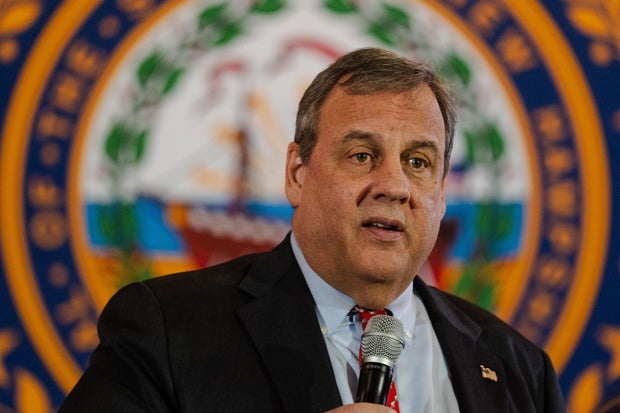
Former New Jersey Gov. Chris Christie dropped out of the race Jan. 10, bringing to a close a bid that focused almost exclusively on him criticizing former President Trump and pressing his Republican opponents to do the same.
His exit came a week before the Iowa caucuses and just over six months after Christie launched his second presidential campaign on June 6.
Christie has called Trump “a bitter, angry man who wants power back for himself” and framed his decision to run for president on his belief that the country is at a pivotal moment of having to choose between “big and small.”
The former New Jersey governor argued that in recent years the country has been helmed by people who have “led us to being small — small by their example, small by the way they conduct themselves, small by the things they tells us we should care about … They’re making us smaller by dividing us into smaller and smaller groups.”
“All throughout our history, there have been moments where we’ve had to choose between big and small,” he said. “I will tell you, the reason I’m here tonight is because this is one of those moments.”
Christie filed paperwork with the Federal Election Commission formalizing his candidacy June 6 and made his announcement in New Hampshire.
Doug Burgum
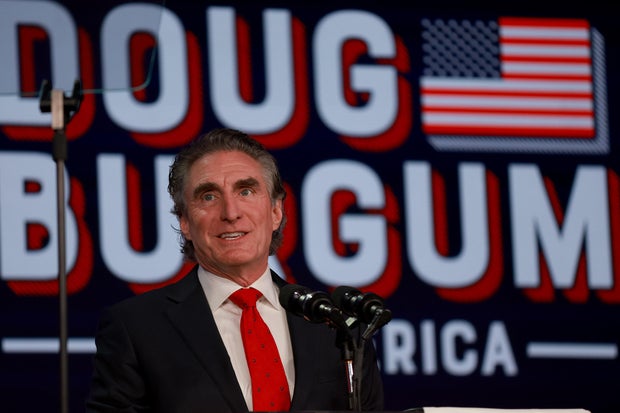
North Dakota Gov. Doug Burgum jumped into the 2024 presidential race on June 7, the same day Pence officially launched his campaign. The governor’s dark-horse bid came after the North Dakota legislature completed its legislative session in May.
“We need a change in the White House. We need a new leader for a changing economy. That’s why I’m announcing my run for president today,” Burgum wrote in an op-ed in The Wall Street Journal.
Burgum has served as North Dakota’s governor since 2016 and was reelected in 2020. A former software company CEO, he grew Great Plains Software into a $1 billion company that was acquired by Microsoft.
He ended his campaign on Dec. 4 after struggling to get name recognition from voters and failing to qualify for the third and fourth primary debate.
Tim Scott
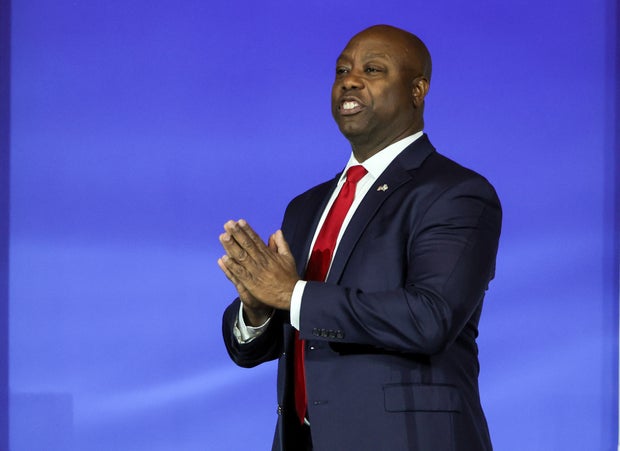
Sen. Tim Scott, of South Carolina, announced in an interview with Fox News on Nov. 12 that he would be dropping out of the race for the GOP presidential nomination.
“I think the voters, who have been the most remarkable people on the planet, have been really clear. They’re telling me not now, Tim,” Scott said.
The South Carolina Republican said that he would not be endorsing another candidate and wasn’t interested in becoming a running mate, as “being vice president has never been on my to-do list for this campaign.”
Scott jumped into the presidential race in mid-May when he filed a statement of his candidacy with the Federal Election Commission. He formally launched his presidential campaign at an event in his hometown of North Charleston on May 22.
“We live in the land of opportunity. We live in the land where it is absolutely possible for a kid raised in poverty, in a single-parent household, in a small apartment to one day serve in the people’s House and maybe even the White House,” Scott said in his campaign announcement.
Mike Pence
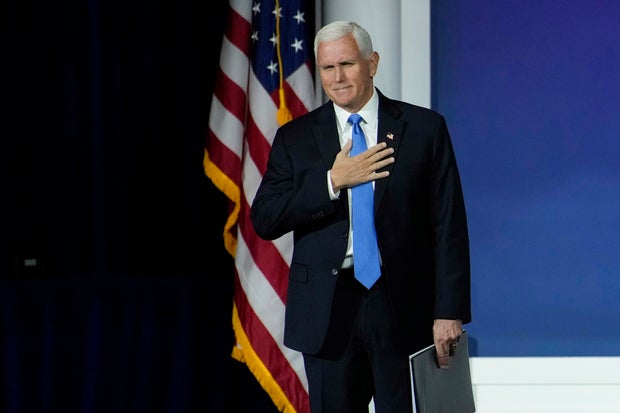
The former vice president and Indiana governor filed the relevant paperwork with the Federal Election Commission on June 5, cementing his place in the GOP field. He launched his presidential campaign Wednesday with a campaign video, and attended a kickoff event in Des Moines, Iowa.
“Different times call for different leadership,” Pence says in the video. “Today our party and our country need a leader that’ll appeal, as Lincoln said, to the better angels of our nature.”
The former vice president said it would be “easy to stay on the sidelines, but that’s not how I was raised. That’s why today, before God and my family, I’m announcing I’m running for president of the United States.”
Pence, who has been visiting early-voting states while he mulled entering the race, has suggested he believes it’s time for the GOP to move on from Trump.
“I think we’re going to have new leadership in this party and in this country,” he told CBS News in January.
Pence also has declined to commit to supporting Trump if he is the Republican nominee, instead saying that he believes GOP voters will choose “wisely again” in 2024 and thinks “different times call for different leadership.”
While Pence has promoted the policies of the Trump administration, he has also criticized the former president for his actions on Jan. 6, saying in November that Trump’s words were “reckless” and put him and his family, who were on Capitol Hill that day for the joint session of Congress, in danger.
After languishing in the polls and struggling to fundraise, Pence suspended his campaign on Oct. 28 during a speech at the Republican Jewish Coalition in Las Vegas.
“We always knew this would be an uphill battle, but I have no regrets,” Pence said. “To the American people, I say this is not my time, but this is your time. I urge you to hold fast to what matters most, faith, family, and the constitution of the United States of America.”
Francis Suarez
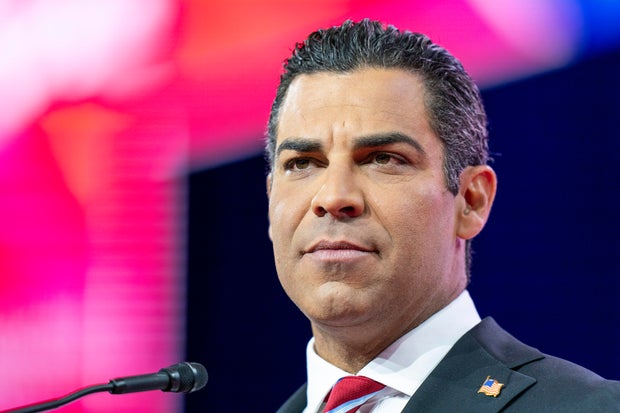
Miami Mayor Francis Suarez announced his decision to suspend his campaign in late August, just two months after hopping into the 2024 race in mid-June. The move came after Suarez failed to qualify for the first Republican presidential primary debate, held in Milwaukee on Aug. 23.
“Running for president of the United States has been one of the greatest honors of my life,” he said. “This country has given so much to my family and me. The prospect of giving back at the highest levels of public service is a motivator if not a calling. Throughout this process, I have met so many freedom-loving Americans who care deeply about our nation, her people, and its future. It was a privilege to come so close to appearing on stage with the other candidates at last week’s first debate.”
Suarez, who is Cuban American, was the only Latino GOP candidate in the 2024 field. He was the second Florida politician to enter the race and has been critical of certain aspects of Florida Gov. Ron DeSantis’ policies and personality. He called DeSantis’ ongoing feud with Disney a “personal vendetta,” and told Fox News that the governor “seems to struggle with relationships, generally.”
Will Hurd
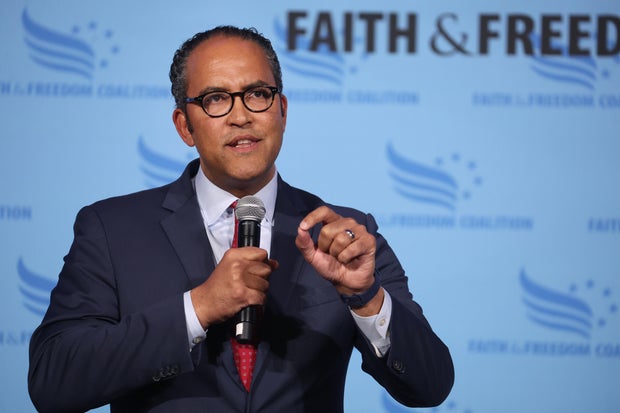
Former Rep. Will Hurd of Texas announced on Oct. 9 that he would be suspending his campaign and endorsing Haley for the Republican presidential nominee.
“While I appreciate all the time and energy our supporters have given, it is important to recognize the realities of the political landscape and the need to consolidate our party around one person to defeat both Donald Trump and President Biden,” Hurd said in a statement.
The former congressman said Haley has “shown a willingness to articulate a different vision for the country than Donald Trump,” and called her knowledge of foreign policy “unmatched.”
Hurd’s decision to leave the race came less than four months after he announced his bid for the 2024 Republican presidential nomination in an interview with “CBS Mornings.”
Hurd, 45, worked as an officer in the CIA for nearly a decade and ran to represent Texas’s 23rd Congressional District in 2014. He defeated the incumbent Democrat by just 2,500 votes and went on to win reelection twice before declining to seek another term in 2020.
Hurd has not shied away from criticizing Trump, including over his handing of classified records and immigration policies, as well as his incendiary tweets. The former congressman authored an op-ed in 2018 that declared Trump is being manipulated by Russian President Vladimir Putin.
Larry Elder
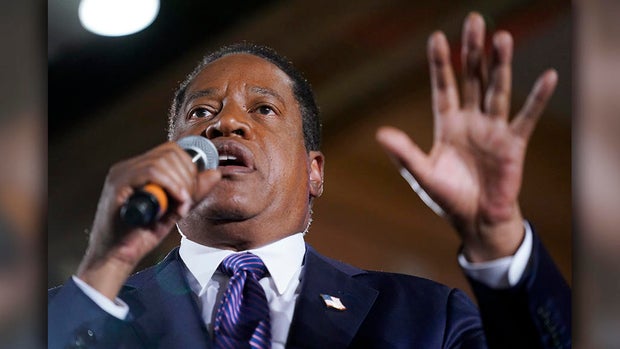
Conservative talk radio host Larry Elder suspended his long-shot presidential campaign on Oct. 26. He tweeted that he had met with Trump “to lend him my endorsement for President.”
He added, “I am grateful for the support I received from so many of you across the country.”
Elder was a gubernatorial candidate during California’s failed 2021 effort to recall Gov. Gavin Newsom. He kept his post, but Elder received the most votes — nearly 3.6 million — out of a large field trying to replace Newsom.
Elder announced his bid for president in April.
Larry Hogan

The former Maryland governor announced March 5 that he would not seek the Republican nomination for president after giving it “serious consideration.”
Hogan said his decision not to pursue the presidency may make it more difficult for Trump to claim the nomination.
Mike Pompeo

Pompeo announced April 13 he will not be joining the race, saying “this isn’t the time.”
“This isn’t our moment,” Pompeo told Fox News’ “Special Report with Bret Baier,” referring to the decision he had made with his wife.
When asked whether Trump’s lead in the polls factored into his decision, Pompeo said, “not at all.”
He left the door open to a future run.
Chris Sununu

Sununu, the governor of New Hampshire, announced on June 5 that he will not seek the GOP presidential nomination in 2024.
He revealed his decision in an interview with CNN and op-ed in the Washington Post, where he wrote that the “stakes are too high for a crowded field to hand the nomination to a candidate who earns just 35 percent of the vote,” a reference to former President Donald Trump’s margin in the 2016 New Hampshire primary.
“The path to winning was clear, but I believe I can have more influence on the future of the Republican Party and the 2024 nominating process not as a candidate but as the governor of the first-in-the-nation primary state — a governor who is unafraid to speak candidly about issues, candidates and the direction of our party, untethered from the limitations of a presidential campaign and unleashed from conventional boundaries,” Sununu wrote.
The New Hampshire governor predicted that if Trump wins the Republican presidential nomination again, it will ensure a GOP loss in 2024.
In 2021, Sununu decided to forgo a run for the Senate to challenge first-term Democrat Maggie Hassan and opted instead to seek a fourth term as governor, which he won in November.




